A water descaler helps you counteract the adverse effects of hard water by preventing the minerals from sticking to pipes and appliances. Unlike ion exchange and salt-free water softeners, water descalers don’t occupy a lot of space, which makes them a fantastic option for homes without the space for a large resin tank.
The best water descaler in 2023 is the Yarna Capacitive CWD24, which offers unlimited grain capacity, water flow rate, and it comes at an affordable price.
Electronic Water Descalers Comparison Table
Best Electronic Water Descalers:
- Yarna Capacitive CWD24 – Best Overall
- iSpring ED2000 – Best For Small Homes
- Eddy ED6002P-US – Best For Moderately Hard Water
- Scalesweeper Water Descaler – Best Price
1. Yarna Capacitive CWD24
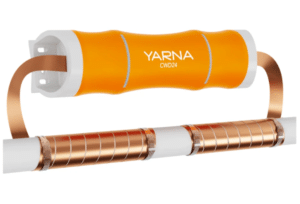
- Grain Capacity: Unlimited
- Flow Rate: Unlimited
- Excellent flow rate and grain capacity
- Compatible with all pipe material
- 365-day money-back guarantee
- Only compatible with ⅜ and 1-inch thick pipes
Yarna Capacitive CWD24 is the best electronic water descaler mainly because it comes with both an unlimited capacity and flow rate. The high grain capacity deals with any water hardness level, while the unlimited flow rate means your water pressure won’t be affected by the descaling process. These qualities make this unit a worthy choice for most homes.
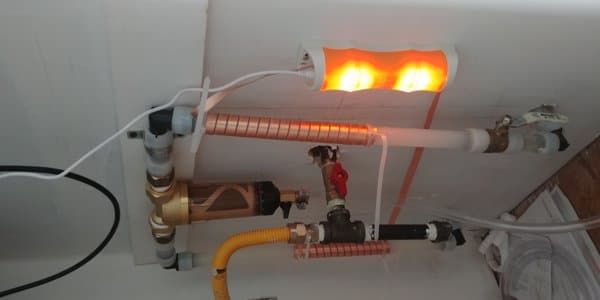
The Yarna Capacitive comes in at 2.2 pounds and runs on a standard 24-volt battery, which generates the 3-32kHz needed to descale the water and remove calcium and magnesium ions without reducing water flow.
What’s more, the manufacturer offers a 365-day money-back guarantee, which gives you the option to test and return the descaler if it doesn’t perform as expected. We didn’t have any issues with this descaler, but having that extra insurance is a good backup.
You can attach this unit to all pipes, and it’ll get the job done. It doesn’t matter if you use stainless steel, copper, or PVC. The descaler generates an electromagnetic field through most materials.
However, it can’t be attached to thick pipes. In fact. it’s only compatible with either ⅜- or 1-inch thick pipes. This limit is an issue because most apartments use 1 ½-inch or 2-inch pipes. If your home also has thick pipes, you won’t be able to use this descaler model.
2. iSpring ED2000
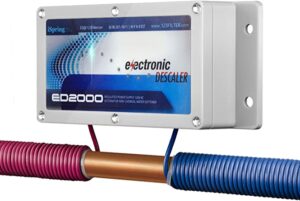
- Grain Capacity: 19 GPG
- Flow Rate: Unlimited
- Very cost-effective
- 1-year warranty
- Works on all pipes
- Lower grain capacity than the other descalers on our list
While the iSpring ED2000 might not be as affordable as the Scalesweeper Water Descaler, it’s still cost-effective and one of the most reasonably priced descalers on the market, considering its unlimited flow rate.
As we mentioned before, the unlimited flow rate means you can attach this unit to any pipe in your home without worrying about a drop in water pressure.
The iSpring’s 1-year warranty will set your mind at ease regarding its functionality.
This unit works with pipes of all materials, including PVC and PEX. The installation is straight-forward. All you need to do is attach the coils to the pipe and then plug the head of the descaler into the coil jacks.
The iSpring ED2000 descaler works with home pipe systems that are up to 50 feet long. Thanks to its long range and unlimited flow rate, the unit is able to soften the water and prevent limescale from forming in all pipes throughout most standard-sized apartments if you just place it on the main water pipe.
The only real drawback of the iSpring is its low grain capacity. The upper boundary is 19 GPG, which is still decent but limits the unit’s usage to only slightly hard water. If you live in an area with moderately hard water, the grain capacity won’t be an issue, but if your water has a high mineral content, this descaler won’t stop limescale from forming.
3. Eddy ED6002P-US
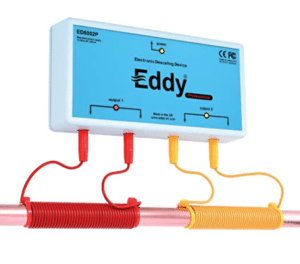
- Grain Capacity: 20 GPG
- Flow Rate: 10 GPM
- 12-month money-back guarantee
- No maintenance required
- Compatible with both copper and PVC pipes
- Limited flow rate
The Eddy has a slightly higher grain per gallon limit than the iSpring we covered in the previous section – 1 GPG higher, to be exact. This single digit isn’t enough to allow this unit to handle very hard water, but it’s enough to give it a slight edge over the iSpring and win the title of the best descaler for households with moderately hard water.
Additionally, while the unit is capped at 20 GPG, it’s still a very effective descaler for eliminating limescale buildup. Its other advantages include compact size, easy installation, and affordable pricing.
It’s also capable of breaking down the existing limescale formed in the pipes before its installation. The water then flushes the dislodged limescale pieces through the faucet and down the drain.
The Eddy comes with a 12-month money-back guarantee and a lifetime warranty. This is excellent coverage for a device in this price range, so you get an amazing bargain.
This unit is compatible with copper and PVC pipes as long as they’re up to 1 ½ inches thick.
The main issue of the Eddy is its narrow flow rate. 10 GPM is limited even for water descalers, restricting its use on a single sink in your home.
4. Scalesweeper Water Descaler
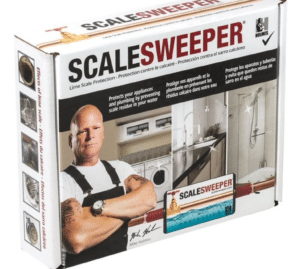
- Grain Capacity: 25 GPG
- Flow Rate: 28 GPM
- Affordable even by descaler standards
- Very easy to install
- Compatible with a large variety of different water types
- Can’t be installed outside
The biggest selling point of the Scalesweeper is its affordability. The $94 price tag is cheap even by descaler standards, making it the obvious choice for anyone on a budget.
Furthermore, the installation is effortless. You still need to wind two coils around the water pipe before you attach the descaler itself, but instead of drilling holes in the wall or putting in nails to hang up the device, this descaler sits on the pipe.
The Scalesweeper weighs only 2 pounds, so it won’t cause pressure on the pipes, and the coils are enough to hold it in place without needing additional support.
Both the flow rate and the grain capacity of this model are middle-of-the-road. There are descalers on our list with better stats, but there are also some with worse stats. Overall, this unit is an ideal fit for a standard-sized home with a slightly higher-than-average mineral content in the water.
Just like all of the other descalers, this device doesn’t require maintenance and doesn’t need to be attached to a resin or salt tank to prevent limescale from forming.
You can use this descaler on pipes made of stainless steel, copper, polyvinyl chloride, and tubes made of PVC and PEX materials.
One of this unit’s few flaws is that it’s not water-resistant. You need to keep it dry, or the circuit might get shorted out, so installing it outside your house is a definite no-go.
What is a Water Descaler?
A water descaler is a softener that prevents limescale from forming inside water pipes. The device typically consists of a control box, coils, and a power cable.
Water descalers generate an electromagnetic field inside the pipes when you place the coils on a water pipe and connect the control box to a power source.
They use this process to prevent the calcium and magnesium minerals in hard water from sticking to the inside of the pipes and forming limescale.
How Does a Water Descaler Work?
Water descalers have a power box at the top that connects to one or two coils. The coils are placed on the water pipes, and the descaler is plugged into a power source. The descaler uses these coils to generate an electromagnetic field inside the water pipe to which they’re attached. Once the water passes through the electromagnetic field, the calcium and magnesium minerals are kept in the water thanks to the field – they don’t stick to the inside walls of the pipe.
This field wears out after some time, but whether that means 10 minutes or several hours depends on the water’s hardness level and the descaler’s effectiveness. Basically, it comes down to how hard your water is and how much GPG the descaler is capable of handling.
If the water is at 15 GPG, but the descaler has a 20 GPG capacity, the electromagnetic field effects should linger for a few hours. However, if the water GPG is higher than the descaler GPG, not only will the water turn hard again immediately after leaving the faucet, but it might not get softened (difference higher than 5 GPG).
Advantages of Water Descalers
Descalers have two substantial advantages over other water softeners: they’re affordable and small.
If you’re going for an ion-exchange water softener or a salt-free model, you ought to have a lot of room in your home for the large tank where the softening process happens. Smaller units are less cumbersome to place, but they’re still nowhere near as convenient as descalers when it comes to space efficiency.
Descalers are also super easy to install. They require an electrical outlet located nearby, but the power cords are usually pretty long, and you can easily use an extension cord.
Other than the fact you want to place them near an outlet, descalers are effortless to position. Attach them to the water pipe, turn the power on, and start your faucet. The descaling process happens automatically.
Other smaller water-softening units that fit under your sink have a starting price of around $200 or $300. While that’s not a lot of money, remember that it’s only for the smallest and cheapest models. And they still cost as much as the most expensive descalers on our list, like the Yarna, which we consider the best overall descaler on the market.
And if that’s not enough, unlike other water-softening devices, water descalers don’t require any maintenance — no salt tanks that need to be refilled, no resin tanks need to be regenerated, and nothing to open or clean.
Disadvantages of Water Descalers
The main issue with water descalers is that the water descaling process works only on the inside walls of the pipes. These devices’ electromagnetic field separates the mineral molecules from the water molecules for a short time, so the water will become hard again once it leaves the tap.
There’s no exact timeframe for how long this electromagnetic field lasts since, depending on the water’s hardness and the descaler’s capabilities, it can be anywhere between 10 minutes to several hours.
Frequently Asked Questions
Let’s answer the questions we often encounter when discussing water descalers online.
The cheapest descaler is the Scalesweeper Water Descaler which costs $94.69.
Water descalers typically sells for $100 to $200. Units like the Yarna are an exception, as the $300 price tag of this particular model is due to the unlimited GPG and flow rate.
Once you decide on which pipe to attach the descaler, you need to wind both of the coils around the pipe. These coils have plugs that go into the descaler. When winding the coil around the pipe, keep in mind that these plugs need to end up at the top since that’s where the descaler will be placed.
Once the coils are in place, ensure they reach the input holes on the descaler. Measure where on the wall you should place the descaler and use the holes on the device to hang it up.
Once that is done, connect the descaler to a power source, and you’re good to go.
Conclusion
The Yarna Capacitive CWD24 has an unlimited flow rate and grain capacity, making it an ideal descaler for any home.
The iSpring ED2000 also has an unlimited flow rate, but the 19 GPG grain capacity makes it unsuitable for homes with very hard water.
The Eddy ED6002P-US features a slightly higher GPG than the iSpring and is a good choice for homes with moderately hard water levels.
The Scalesweeper Water Descaler is very affordable yet offers grain capacity of 25 GPG, making it an obvious choice for areas with very hard water in the pipes